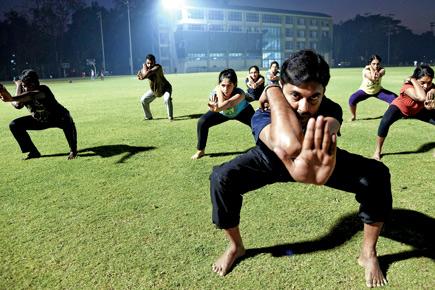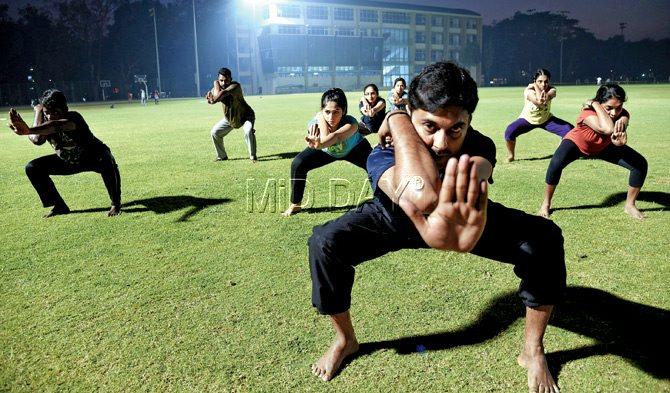Not on Twitter, but into a Kalaripayattu class. Turns out, it is as good for your health as it is for your DPs

Coach Belraj Soni with his students at IIT Powai
ADVERTISEMENT
Actress Parineeti Chopra attributes her new-found body to Kalaripayattu. While that statement may not be all above-board, we realise that she isn’t the only one ditching the gym for the Kerala martial art form. Priya Anchan, 31, belongs to a large chunk of corporate professionals whose chaotic work hours lead to unhealthy lifestyles.

Coach Belraj Soni with his students at IIT Powai. Pic/Sameer Markande
“The gym did not excite me. And I was clear about one thing, I wanted to learn a physical activity that had its roots in India,” says the Ghatkopar resident. Through an online search, she chanced upon tutor Belraj Soni’s Kalaripayattu classes in Vidyavihar. It’s been one and a half years since Anchan has been practicing this martial art form which dates back to 13th century. “It keeps me energised, active, and more confident. Kalari has complex movements, but you get a hang of it with practice,” she says, sounding upbeat even though she’s just ended a one-hour session.
There are many like Anchan and Parineeti. Several Mumbaikars are opting for kicks, leaps, crouches, cross-splits, and brandishing metal arms as a fitness regime over other modern alternatives. For Dilna Shreedhar, a research student at IIT Powai, Kalaripayattu offered relief from asthma. “Breath control is an integral part of the practice, due to which lung related problems wanes away in short time,” she says.
The term kalaripayattu translates to “practice in the arts of the battlefield.” Practitioners work in a structure known as a kalari that provides space for instruction and practice, along with room for bouts in which two students work in a mock duel.
But, it’s more than just a fitness solution. Soni, who teaches the art at Somaiya Vidyavihar three times a week, says most of his students are from theatre, dance and movement arts who have joined in to extend their repertoire.
“People from theatre and dance consider this a way to increase flexibility, a bonus in their professions,” says the 42-year-old who has been teaching Kalari for 24 years.
Palak Lalwani, actor and a student of Soni, says Kalari teaches Gaja Vadivu (Elephant Posture) that comes in handy in physical theatre. “Sometimes actors need to sit in that position for hours, Kalari helps you gets the stance right,” says the Andheri resident.
The session begins with a 5-minute warm-up followed by leg lifting exercises, Meithari (body control exercises designed in a special sequence) and mock duel. Soni says it takes about 3-4 years for one to master the art. He cautions that the movements need to be practiced in the presence of a trained instructor. “Kalari cannot be learned in capsules format. It demands patience and total dedication.”
 Subscribe today by clicking the link and stay updated with the latest news!" Click here!
Subscribe today by clicking the link and stay updated with the latest news!" Click here!












